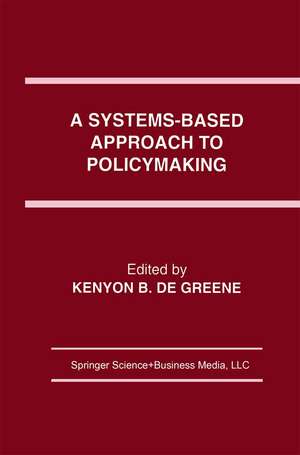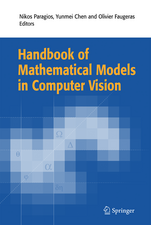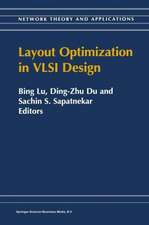A Systems-Based Approach to Policymaking
Editat de Kenyon B. de Greeneen Limba Engleză Paperback – noi 2012
| Toate formatele și edițiile | Preț | Express |
|---|---|---|
| Paperback (1) | 1275.75 lei 6-8 săpt. | |
| Springer Us – noi 2012 | 1275.75 lei 6-8 săpt. | |
| Hardback (1) | 1282.18 lei 6-8 săpt. | |
| Springer Us – 30 apr 1993 | 1282.18 lei 6-8 săpt. |
Preț: 1275.75 lei
Preț vechi: 1594.69 lei
-20% Nou
Puncte Express: 1914
Preț estimativ în valută:
244.11€ • 255.56$ • 201.99£
244.11€ • 255.56$ • 201.99£
Carte tipărită la comandă
Livrare economică 05-19 aprilie
Preluare comenzi: 021 569.72.76
Specificații
ISBN-13: 9781461364177
ISBN-10: 1461364175
Pagini: 380
Ilustrații: XIX, 355 p.
Dimensiuni: 155 x 235 x 20 mm
Greutate: 0.53 kg
Ediția:Softcover reprint of the original 1st ed. 1993
Editura: Springer Us
Colecția Springer
Locul publicării:New York, NY, United States
ISBN-10: 1461364175
Pagini: 380
Ilustrații: XIX, 355 p.
Dimensiuni: 155 x 235 x 20 mm
Greutate: 0.53 kg
Ediția:Softcover reprint of the original 1st ed. 1993
Editura: Springer Us
Colecția Springer
Locul publicării:New York, NY, United States
Public țintă
ResearchCuprins
1. Policy Challenges in a World of Nonlinearity and Structural Change.- and Main Assumptions and Problem Sets.- New Thinking for New Times.- What is Policymaking?.- Cognitive/Emotional Models of Policymakers and Decisionmakers.- A Simple Mathematical Model of Nonlinearity.- Structural Change the Kondratiev and Hegemonic Cycles/Structures and the Life Cycle of the Present Stage of World.- Civilization.- Let the Policy Fit the Time.- Conclusions and Recommendations—Policy Guidance.- References.- 2. Policy in a World of Evolution, Learning, and Ignorance.- The Mechanical and Organic Open-Systems Paradigms Further Contrasted.- Evolutionary Drive.- Applications for Policy Exploration: From Settlement To Finance.- Discussion.- References.- 3. Adaptive Control and Conflict Resolution for International Stability.- Overview of International Stability and Conflict Resolution Issues.- The Peace/War/Peace Process and Some of its Elements.- International Stability and Peace.- Nation Block Diagrams.- Peace/War/Peace Time (Activity) Cycle.- Normal, Alert, or Emergency Conditions of International Policymaking and Decision-Making.- Adaptive Control Features for International Relationships.- Basic Assumptions about the International System and Conflict.- Elements of Conflict Resolution.- Potential Areas for International Conflict.- Progress Toward International Stability and Peace.- Common Security Objectives.- Influence of the Past, Present, and Future on National Attitudes.- Decrease the Likelihood of War, Increase the Likelihood of Peace.- What is to be Done Now?.- Conclusions.- References.- 4. Field-Theoretic Framework for Systems Theory and Systems Thinking.- The Nature and History of Field Theory Applied to Nonliving and Living Systems.- Alternative or Complementary Perspectiveson.- Field Theory and on World Systems.- Synopsis and Interfacing of Current Systems Theories.- Field-Theoretic Principles.- Faith, Ideology, Science, and Religion.- The Acceptance of New Paradigms.- Guided Structural Change in the World System Field.- Final Remarks.- References.- 5. School for Rulers.- Contemplating the Taboo: Rulers Must Learn.- Premises and Thesis.- Ideological and Structural Hurdles.- Design of a School For Rulers.- Back to Reality: Practical Recommendations.- Epilogue.- References.- 6. Policy: Appearance and Reality.- Introduction: Overview of “Problems” and “Solutions”.- Concepts and Definitions of Policy.- Distinctive Problems of Policy Formulation.- A Systems-Theoretic Interpretation.- Four World Hypotheses.- Limitations of Formism and Formal Rational Models.- Policy Expertise, and Rationality Revisited.- Challenges and Recommendations.- References.- 7. System Dynamics and the Lessons of 35 Years.- Designing Managerial and Social Systems.- A New Education for Corporate and Government Leaders.- Modeling for What Purpose?.- The System Dynamics Paradigm.- Learning From Models.- A New Basis for Pre-College Education.- References.- 8. Whole-System Concepts in Societal Transformation.- Signs of A Fundamental Transformation.- Policies for Whole-System Transformation.- Concluding Observations.- References and Suggested Reading.- 9. Breaking out of the Systems Quandary.- The Systems Quandary.- Breaking Out.- Final Words.- References.- 10. Decision Management, Then and Now, 1790, 1890, and 1990: Selected Scenario Models.- Some Definitions and Limitations.- A Basic Decision-And-Command Management Model.- Two Brief Scenario Models.- Decisionmaking in the Gulf Crisis/War: Events of 1990–1991.- Significance of the Gulf Episode.- Conclusions.-References.










